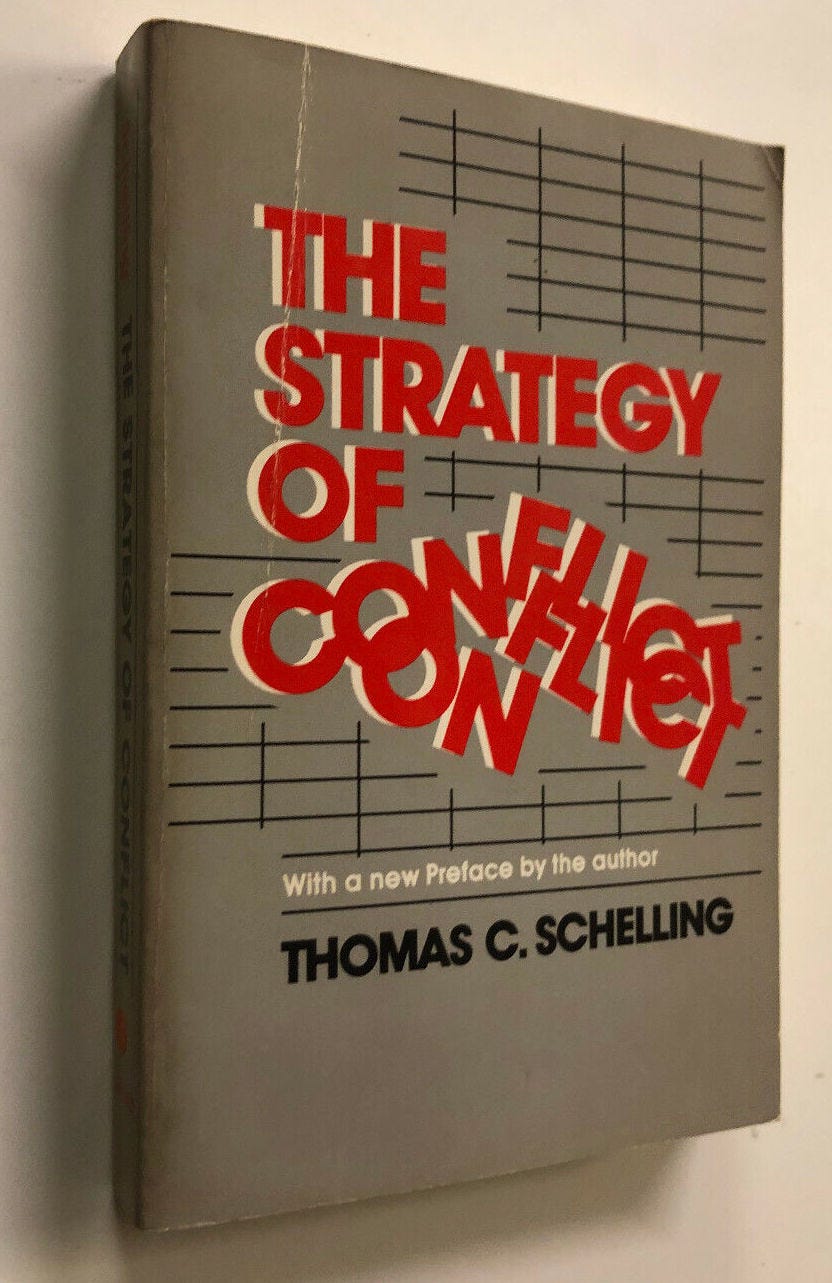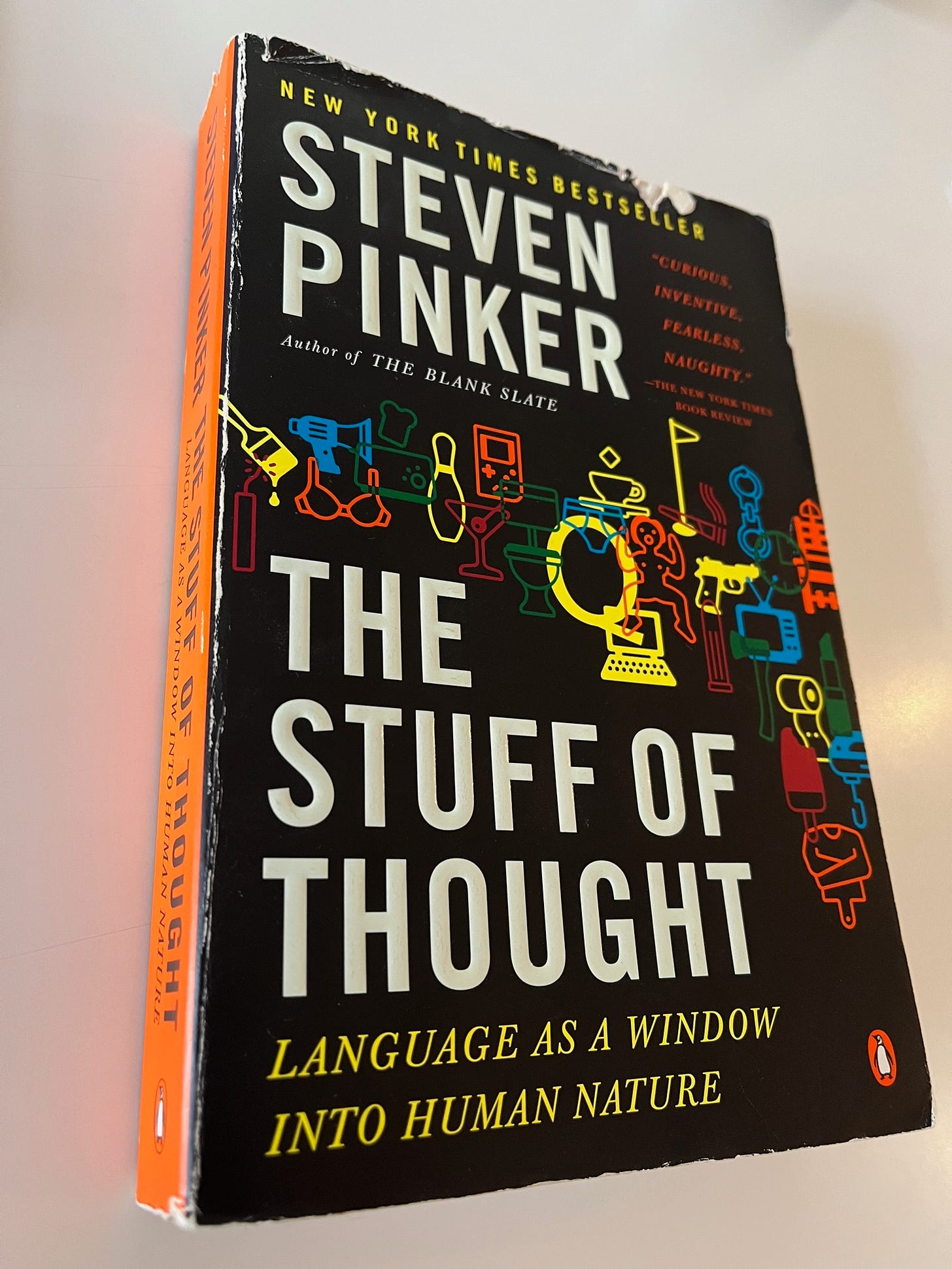The Power of Ambiguity in Threats and Promises
Navigating the gray area in human interaction
“That’s not a threat, that’s a promise.”
I heard this phrase a lot when I was growing up. For example, a student would purposely kick the desk of another kid. The kid would say, “If you kick my desk one more time, I will break your fucking nose. That’s not a threat, that’s a promise.”
The phrase is incorrect—it’s a threat. But calling it a “promise” might amplify how the threat is perceived.
The economist and Nobel laureate Thomas Schelling has pointed out that threats are not the same as promises.
The Strategy of Conflict (1960) contains a series of essays on game theory. Schelling discusses bargaining, extortion, war, deterrence, and more. In this book, Schelling first introduced his now well-known concept of “focal points.” Or what people often refer to as “Schelling points.”
The Strategy of Conflict distinguishes between threats and promises:
“A promise is different from a threat. The difference is that a promise is costly when it succeeds, and a threat is costly when it fails. A successful threat is one that is not carried out. If I promise more than I need to as an inducement, and the promise succeeds, I pay more than I need to. But a threat that is ‘too big’ is likely to be superfluous rather than costly.”
In other words, a successful promise is one that must be carried out. If you don’t fulfill your promise, you have failed.
In contrast, a successful threat is one that doesn’t have to be carried out. If you actually have to carry out your threat, you have failed.
The whole point of a threat is that you don’t actually want to fulfill it. Especially if it is costly to you. You want your target to behave in a certain way using words alone— without you actually having to do anything.
Schelling also points out that it is harder to build a reputation as someone who carries out their threats than someone who keeps their promises.
If you make five promises and keep all five of them, your reputation is secure. You’re someone who keeps up their end of the bargain.
If you make five successful threats, we don’t really know if you could make good on actually carrying them out. Often, in order to establish the credibility of your threats, you have to fulfill one of them early.
It may even be beneficial for you to orchestrate a situation where your threat “fails,” such that you must then perform the action you threatened to do. This would bolster your reputation as someone who can make good on your threats.
Interestingly, the risk of your threat failing (meaning you actually have to carry it out) gives you an incentive to choose minor or moderate rather than excessive threats.
If the only threat you ever make is some horrific act that would cost you a great deal, then you are forced to carry it out and incur the outsized cost. If you don’t, you incur another cost—looking weak. So if you’re going to issue threats, proportionality is often wise.
A clever workaround, though, is to surround the threat with ambiguity. That way you can eat your cake and have it too (I’ve always preferred to say it this way, the other way makes no sense).
In other words, if you issue a veiled threat, you can choose whether you want to carry it out without damaging your reputation.
In The Stuff of Thought (2007), psychologist Steven Pinker discusses this idea in a chapter titled “Games People Play” (likely inspired by Eric Berne’s work).
People generally mask their threats for two reasons.
1. A plain-speaking extortionist would be exposing himself to the possibility of legal penalties.
2. He also faces the risk that his target will call his bluff by defying the threat. Thus he has to carry out the threat, which is risky and costly. And possibly pointless, since the threat didn’t even have the intended effect of coercing his target.
An ambiguous threat solves both problems.
If the threat is shrouded in ambiguity, the extortionist is harder to convict. And if his target defies him, he can decide not to carry out his threat without undermining his credibility.
The Sopranos has many episodes depicting veiled threats.
In this scene, mobster Bobby Bacala introduces himself as “Jim Blake” to a local union leader. Bobby subtly intimidates the union leader into changing his vote in an upcoming union election.
Union Leader: I know what you're trying to do.
Bobby: You look like a smart guy. I can see why your local puts their faith in you to do the right thing. I'm just saying if it was me, I got kids that depend on me, much like yourself. And to waste my votes on somebody like Dick Hoffman? I might as well put a bullet in my head.
[makes a gun gesture with his thumb and index finger and points it to his own head]
Bobby: Here, here, and here.
Thomas Schelling states that studying the criminal underworld is a profitable way to understand human nature. From The Strategy of Conflict:
“Where trust and good faith do not exist and cannot be made to by our acting as though they did, we may wish to solicit advice from the underworld, or from ancient despotisms, on how to make agreements work when trust and good faith are lacking.”
Many individuals say they long for plain speaking. They claim to prefer people who get to the point and say what they mean using unadorned speech.
That is, these individuals would like for others to be plainspoken, while reserving the use of indirect speech for themselves.
Communication stripped of ambiguity, innuendo, and sugarcoated utterances would be a miserable state of affairs for just about everyone.
Indirect speech evolved for a reason.





Interesting. That very issue of indirect communication versus concise expressions has been central to a stressful tension in my own life in the last week. And it’s been a recurring theme for me over the years.
In this present situation, at a family-owned business meeting, I asked for clarification on some figures on an expense report. The person responsible for the report clearly became defensive, which gave the implication that what I said was taken as a lack of confidence or trust. I felt frustration that undue emotional considerations were required to ask appropriate questions, and that speaking with such around-and-about manners often leaves questions less than clarified. While there were never any contentious words nor tones, it just seemed that what I considered appropriate persistence was very distressing to the other individual. And that became apparent in subsequent emails that, again, to me seemed nothing but objective and clear communication, with no accusatory elements to them, yet seemed to escalate a skewed perspective in the other person.
The whole thing has been distressing. And as mentioned earlier, I have many times found myself in similar situations where I seem to push someone’s buttons when I’m simply trying to articulate something (obviously something of personal significance) in a clear and concise manner. To me, it’s like, isn’t communication better when it’s not ambiguous? I tell myself that I would prefer such even if it was somewhat unpleasant.
Your suggestion that people sometimes want to press others directly while reserving the right to innuendo-speak for themselves is intriguing.
Dude. Always knocking it out the park with solid content. 🤘🏼